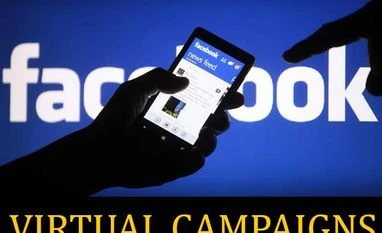On April 1, Facebook caused consternation across India’s electoral landscape when it removed a large number of pages with political content. Nathaniel Gleicher, head of cybersecurity policy at Facebook, announced that the social network had removed “687 Facebook pages and accounts engaged in coordinated inauthentic behaviour and linked to individuals associated with an IT Cell of the INC (Indian National Congress).”
Gleicher also said, “We removed 15 Facebook pages, groups and accounts that engaged in coordinated inauthentic behaviour linked to individuals associated with an Indian IT firm, Silver Touch.” Further, Facebook removed 321 pages and accounts that were uncoordinated.
The Congress IT cell allegedly ran 138 deleted pages and 549 deleted Facebook accounts with about 206,000 followers in total. They ran advertisements for which they had collectively spent the rupee equivalent of $39,000 between August 2014 and March 2019.
Silver Touch, or “individuals associated with Silver Touch”, ran one Facebook page, 12 Facebook accounts, one Facebook group and one Instagram account. Silver Touch is an Ahmedabad-based IT group that created the NaMo App. The Facebook page, “The Indian Eye”, had 2.6 million followers, while there were 15,000 accounts in the Facebook group and about 30,000 followed the Instagram account. The removed Silver Touch pages had paid around $70,000 in Facebook ads placed between June 2014 and February 2019.
The social network did not give much detail about the deleted 321 pages and accounts that were uncoordinated. However, other media investigations revealed that these mainly generated and propagated pro-Bharatiya Janata Party content. Several affected page owners claimed over two million followers.
Now, what is “inauthentic behaviour”? It is the use of impersonation, or fake accounts, or multiple accounts with the same name. These can be used to generate “likes” and enable wider sharing. Multiple accounts can be used to cross-post the same content across networks of pages and groups to drive traffic to the same external websites, which might be laced with malware or spyware.
This behaviour can be coordinated, as in the case of the Congress IT cell and Silver Touch accounts. It was not coordinated in the case of the 321 other pages and accounts. Facebook is careful to note that it is objecting to the behaviour, not the content.
In this instance, the content was political. In other cases, where Facebook has made similar shutdowns, the content has often been laced with ads for fake remedies, or spyware or malware, designed to grab personal data and phish for financially sensitive information.
It’s hardly surprising that entrepreneurs have jumped onto the election bandwagon in the hope of generating money and, indeed, it’s not surprising that they focus more on generating pro-BJP content. During the US presidential campaign of 2016, a bunch of Macedonians who couldn’t care less who won the elections, made money by running pro-Trump content. They discovered that Donald Trump supporters were, on average, more gullible and hence, easier to exploit. Something similar may well be going on here.
Facebook itself has already benefited substantially from elections. Between February and March 30 2019, Facebook has shown 51,810 political ads pertaining to the Lok Sabha election. It has received Rs 10.3 crore from those ads in that two-month period.
The bulk of the spend was from BJP affiliates. The three biggest spenders were Bharat Ki Mann Ki Baat, which put down Rs 2.23 crore for 3,726 ads, My FirstVote for Modi (Rs 1.05 crore, 7,194 ads) and Nation with NaMo (Rs 1.19 crore, 2,288 ads). BJP’s official Facebook page put up 1,101 ads (Rs 36 lakh). MyGov India — a page run by digital marketer Akash Jain who is “blessed to be followed by PM Modi” — contributed Rs 43 lakh. Smaller spends were made by a NaMo merchandise page and by individual politicians.
The Indian Political Action Committee run by Prashant Kishor put up a relatively tiny Rs 58 lakh, and it also made contributions on behalf of the YSR Congress. A little surprisingly, the Biju Janata Dal of Odisha appears to be the second largest advertiser in terms of Indian parties, with an ad-spend of Rs 48 lakh across multiple pages. The YSR Congress has spent at least Rs 20 lakh on Facebook so far. The Congress and its associates have spent a paltry Rs 9 lakh, while the AIADMK has spent around Rs 3 lakh.
The social network will see the pace of advertising hotting up through April-May. Ads on Facebook can also plausibly circumvent localised 48-hour campaign freezes before voting in each phase. Campaign ads could well be served onto a voters’ timeline as she stands in front of the booth. It promises to be a profitable but tense election for the social network.
Unlock 30+ premium stories daily hand-picked by our editors, across devices on browser and app.
Pick your 5 favourite companies, get a daily email with all news updates on them.
Full access to our intuitive epaper - clip, save, share articles from any device; newspaper archives from 2006.
Preferential invites to Business Standard events.
Curated newsletters on markets, personal finance, policy & politics, start-ups, technology, and more.
)